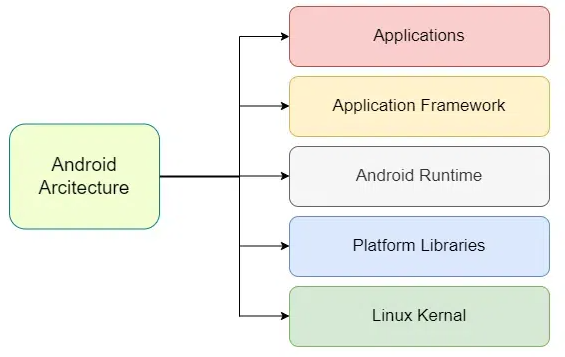Following Key Topics to Cover in Android Development-
1) Introduction to Android Development
- What is Android?
- History and Evolution of Android
- Android Development Tools
- Setting Up Android Development Environment
2) Android Basics
- Android Architecture Overview
- Components of Android Application
-
Activities, Services, Broadcast Receivers, Content
Providers
- AndroidManifest.xml
3) User Interface Design
-
Layouts (Linear, Relative, Constraint, Frame, Table)
- Views and ViewGroups
-
UI Widgets (TextView, EditText, Button, ImageView,
etc.)
- Material Design Guidelines
4) Android Programming Basics
-
Basic Java Concepts (Variables, Data Types, Control
Structures)
- Activity Lifecycle
- Intents and Intent Filters
- Handling User Input
5) Working with Resources
- Drawable Resources
- Layout Resources
- String Resources
- Using Android Resource IDs
6) Data Storage and Persistence
- Shared Preferences
- Internal Storage
- External Storage
- SQLite Databases
- Content Providers
7) Networking and Web Services
- Using HTTPURLConnection
- JSON Parsing
- RESTful APIs
-
Asynchronous Programming with AsyncTask and
AsyncTaskLoader
8) Working with Multimedia
- Playing Audio and Video
- Recording Audio and Video
- Camera API
- Image Loading Libraries (Glide, Picasso)
9) Background Processing and Threads
- Using Handlers and Threads
- Background Services
- Foreground Services
- JobScheduler and WorkManager
10) Location-Based Services
- Accessing Device Location
- Google Maps Integration
- Location Updates
- Geocoding and Reverse Geocoding
11) Android Security
- Permissions
- Secure Coding Practices
- Encryption and Decryption
- Using ProGuard for Code Obfuscation
12) Publishing and Distribution
- Generating Signed APKs
- Google Play Store Submission Process
-
App Distribution Platforms (Google Play Store,
Amazon Appstore)
- App Monetization Strategies
Mastering Android Development is essential for
creating modern mobile applications for the Android
platform. This curriculum covers the fundamental
topics needed to become proficient in Android app
development. By understanding these concepts, you can
build robust and feature-rich Android applications.
Best of luck with your learning journey!



